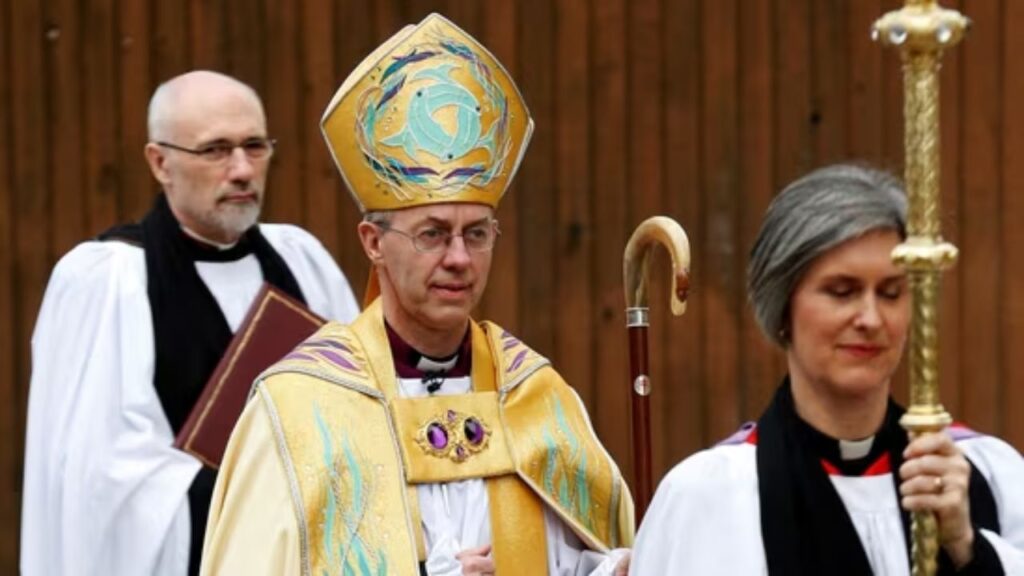The Church of England’s top cleric, Justin Welby, resigned “in sorrow” on Tuesday as Archbishop of Canterbury.
The Church of England’s top priest, Archbishop of Canterbury Justin Welby, resigned “in sorrow” on Tuesday, claiming he had neglected to conduct a thorough inquiry into claims of abuse by a volunteer at Christian summer camps decades prior. In addition to marrying Prince Harry and Meghan Markle, Welby oversaw Queen Elizabeth II’s burial and King Charles III’s coronation.
Welby, who is also the spiritual head of 85 million Anglicans worldwide, was called to step down after a study last week revealed that he had not done enough to stop what was likely the most prolific serial abuser in the Church.
Welby stated that he must accept “personal and institutional responsibility” for his inaction about the “heinous abuses” in his letter of resignation.
“The last few days have renewed my long felt and profound sense of shame at the historic safeguarding failures of the Church of England,” Welby stated.
“I believe that this decision demonstrates the Church of England’s deep commitment to making the church safer and how seriously we take the need for change. I resign with deep sadness for all abuse victims and survivors.
Stephen Cottrell, the second-ranking cleric in the Church and the Archbishop of York, described Welby’s resignation as “the right and honorable thing to do.”
Welby oversaw a decade of significant turmoil during which he had to mediate conflicts between liberal churches, primarily in North America and Britain, and their conservative counterparts, particularly in Africa, over issues like women clergy and homosexual rights.
Following their declaration last year that they no longer had faith in Welby, the Anglican churches in African nations like Uganda and Nigeria are probably going to applaud his resignation.
Holding together the increasingly divided Anglican Communion throughout the world and trying to reverse a loss in church attendance—which has decreased by a fifth in Britain since 2019—will be his successor’s biggest tasks.
Five days after being singled out for condemnation by the independent Makin Report for his handling of abuse claims that went back to the 1970s, Welby, 68, resigned.
The investigation claimed that over 100 adolescents and young men had been the victims of “brutal and horrific” physical and sexual abuse by British lawyer John Smyth over a 40-year period.
According to the investigation, Smyth used up to 800 cane strokes on some victims and provided diapers to stop the blood. After that, he would cover his victims with his arms and occasionally give them a back or neck kiss.
Prior to being ordained, Welby served as a dormitory officer at the Christian camps in Dorset, England, which were supported by the Iwerne Trust, of which he was chair.
According to the findings, Smyth relocated to Africa in 1984 and carried on abusing people there until he was almost killed in 2018.
To the study, Welby learned about the sexual assault allegations at the camps no later than that year, months after he was appointed archbishop, and the Church of England was aware of them at the highest level in 2013.
According to the report, there could have been a thorough investigation and Smyth might have been charged before his death if the allegations had been brought to the attention of the police in 2013. In 2019, the Makin Report was commissioned.
Although Welby expressed regret for his “failures and omissions,” he said that prior to 2013, he had “no idea or suspicion” of the accusations. The study accused him of failing in his “personal and moral responsibility” to oversee a competent probe, concluding that this was implausible.
A group of clerics and a chair, chosen by the British prime minister, must submit two candidates to the church for the selection of a new archbishop of Canterbury.
Both Guli Francis-Dehqani, the Bishop of Chelmsford, and Graham Usher, the Bishop of Norwich, are predicted to follow Welby as the 106th Archbishop of Canterbury.
Usher has been vocal about the need to address climate change and supports homosexual rights.
Born in Iran, Francis-Dehqani has talked about her brother’s assassination following the Iranian Revolution. She would hold the position for the first time as a woman.
(Editing by Sarah Young, Elizabeth Piper, and Kevin Liffey; reporting by Andrew MacAskill and Muvija M.)
